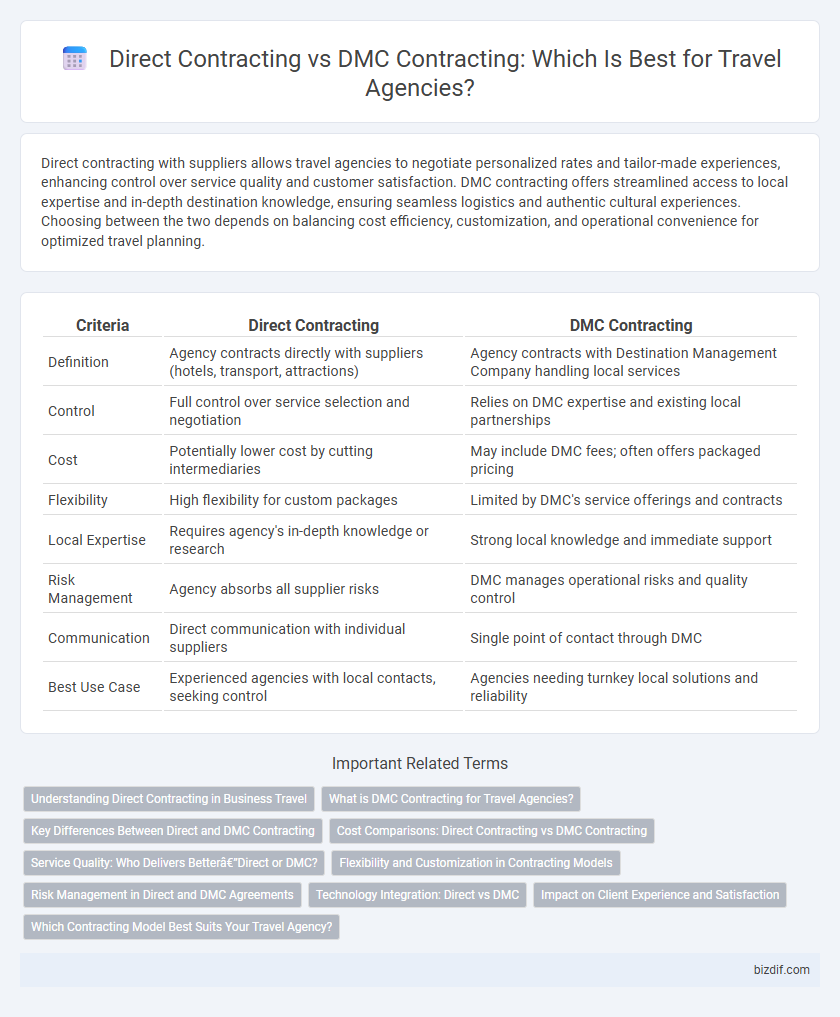Direct contracting with suppliers allows travel agencies to negotiate personalized rates and tailor-made experiences, enhancing control over service quality and customer satisfaction. DMC contracting offers streamlined access to local expertise and in-depth destination knowledge, ensuring seamless logistics and authentic cultural experiences. Choosing between the two depends on balancing cost efficiency, customization, and operational convenience for optimized travel planning.
Table of Comparison
| Criteria | Direct Contracting | DMC Contracting |
|---|---|---|
| Definition | Agency contracts directly with suppliers (hotels, transport, attractions) | Agency contracts with Destination Management Company handling local services |
| Control | Full control over service selection and negotiation | Relies on DMC expertise and existing local partnerships |
| Cost | Potentially lower cost by cutting intermediaries | May include DMC fees; often offers packaged pricing |
| Flexibility | High flexibility for custom packages | Limited by DMC's service offerings and contracts |
| Local Expertise | Requires agency's in-depth knowledge or research | Strong local knowledge and immediate support |
| Risk Management | Agency absorbs all supplier risks | DMC manages operational risks and quality control |
| Communication | Direct communication with individual suppliers | Single point of contact through DMC |
| Best Use Case | Experienced agencies with local contacts, seeking control | Agencies needing turnkey local solutions and reliability |
Understanding Direct Contracting in Business Travel
Direct contracting in business travel enables travel agencies to establish agreements directly with suppliers, such as hotels and airlines, ensuring personalized rates and enhanced control over travel arrangements. This approach reduces dependency on intermediaries, leading to improved cost efficiency and customized service offerings tailored to corporate clients' specific needs. By leveraging direct contracts, agencies can deliver superior value and foster stronger partnerships in the business travel ecosystem.
What is DMC Contracting for Travel Agencies?
DMC contracting for travel agencies involves partnering with Destination Management Companies that offer local expertise, personalized services, and access to unique experiences at the destination. Unlike direct contracting, DMCs handle ground arrangements such as transportation, accommodation, and guided tours, ensuring seamless logistics and high-quality service delivery. This approach allows travel agencies to expand their service portfolio with reliable local partners, reducing operational complexities and improving customer satisfaction.
Key Differences Between Direct and DMC Contracting
Direct contracting involves travel agencies working straight with hotels, airlines, and service providers, securing customized rates and terms without intermediaries, which often leads to greater control and cost savings. DMC contracting engages Destination Management Companies to handle local logistics, offering expert knowledge, on-ground support, and bundled services that streamline operations but may introduce higher costs. The key differences lie in control level, service customization, local expertise, and pricing structure, with direct contracts favoring autonomy and DMC contracts emphasizing convenience and comprehensive local management.
Cost Comparisons: Direct Contracting vs DMC Contracting
Direct contracting with suppliers often results in lower overall costs by eliminating intermediaries, allowing travel agencies to negotiate better rates for accommodations, transportation, and activities. DMC contracting can offer bundled services and local expertise that reduce logistical expenses but may include service fees that increase the total cost. Careful cost analysis comparing direct supplier rates and DMC packages is essential for travel agencies to optimize profitability and offer competitive pricing.
Service Quality: Who Delivers Better—Direct or DMC?
Direct contracting often ensures higher service quality through direct communication and strict adherence to brand standards, allowing travel agencies to maintain control over every detail. Destination Management Companies (DMCs) offer localized expertise and on-the-ground support, enhancing the guest experience with tailored services and immediate problem-solving. Choosing between direct suppliers and DMCs depends on the desired balance between control and local insight for optimal service quality.
Flexibility and Customization in Contracting Models
Direct contracting with suppliers offers maximum flexibility and customization, allowing travel agencies to tailor services and negotiate terms specific to client needs without intermediaries. DMC (Destination Management Company) contracting provides a structured approach, combining local expertise and pre-negotiated packages that streamline operations but may limit flexibility in modifying itineraries. Agencies seeking highly personalized experiences often prefer direct contracts, while those prioritizing efficiency and comprehensive destination knowledge rely on DMC partnerships.
Risk Management in Direct and DMC Agreements
Direct contracting with suppliers offers greater control over terms but involves higher risk exposure due to lack of intermediary safeguards. DMC (Destination Management Company) agreements provide risk mitigation through their local expertise, established vendor relationships, and liability coverage, minimizing unforeseen issues. Effective risk management in travel agency agreements requires careful evaluation of contractual obligations, cancellation policies, and compliance with local regulations to protect financial and reputational interests.
Technology Integration: Direct vs DMC
Direct contracting allows travel agencies to integrate proprietary technology platforms seamlessly, enabling real-time inventory updates and personalized customer experiences. DMC contracting often involves leveraging the operator's established technology systems, which may limit customization but provide specialized local insights and streamlined communication. The choice impacts the agency's ability to innovate and control the booking process through technological integration.
Impact on Client Experience and Satisfaction
Direct contracting ensures personalized service and real-time communication, enhancing transparency and flexibility, which significantly boosts client satisfaction. DMC contracting leverages local expertise and established vendor relationships, offering tailored experiences that meet diverse client needs efficiently. Choosing the right approach directly influences the quality, responsiveness, and uniqueness of travel itineraries, shaping overall client experience and retention.
Which Contracting Model Best Suits Your Travel Agency?
Direct contracting offers travel agencies greater control over pricing and personalized services by establishing agreements directly with airlines, hotels, and local suppliers, enhancing profit margins and customer satisfaction. DMC contracting simplifies operations by outsourcing local arrangements to specialized Destination Management Companies, ensuring expert handling of logistics and on-ground experiences while reducing administrative workload. Evaluating your agency's size, target market, and in-house expertise helps determine whether direct partnerships or DMC collaborations better align with your strategic goals and operational capacity.
Direct contracting vs DMC contracting Infographic

 bizdif.com
bizdif.com